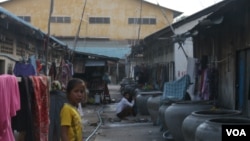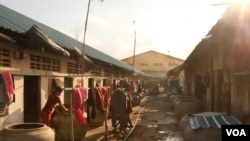Sok Ren lives in a tiny room in a rented house in Phnom Penh. She has not been home in two years, having decided to leave a child behind and find work in the city’s garment sector. “Since I had no job in my province, I had to move to the city to find a job, for my family,” she told VOA Khmer recently. She is 38 years old, works eight hours a day, and typically brings home about $130 per month. She pays $20 per month in rent, and she manages to send some money home each month. But the cost of food, electricity and rent are going up, she said, and she’s not sure how much longer she can stay above water.
Unions say workers need at least $177 per month to make a living wage. Factories disagree. Now, the International Labor Organization has issued a review of the garment sector, showing rapid growth in the sector.
In a statement, the ILO said workers and unions are “understandably concerned” about the wages. “On the other hand, it is also vital that the impact of the minimum wage on enterprises, productivity, competitiveness and employment is taken into account,” it said.
It remains to be seen whether the wage is increased, setting the stage for more strikes, and potentially violent crackdowns from authorities in this traditionally restive sector.
Ath Thon, head of the Coalition of Cambodian Apparel Workers’ Democratic Union, told VOA Khmer the current minimum wage, $128 per month, is not enough for workers.
An increase would not make factories less competitive globally, he said, because all factories must provide a wage high enough for workers to live. “The minimum wage for any individual country cannot be lower than this, because this is for the basic needs,” he said.
Yaing Sophorn, president of the Cambodian Alliance of Trade Unions, said the garment, textile and footwear sector has grown dramatically, making a fair wage even more critical. Workers do not have enough money for food without working overtime, she said. Higher wages would allow more time for workers to acquire more skills and earn even better wages, she said.
At stake are the reputations of companies that fail to meet the basic wages, Ath Thon said. If Cambodian factories can’t provide good wages, the country’s workers will emigrate elsewhere. “They are mistaken to say that increasing the wage would cause investors to flee,” he said. “In fact, if we maintain those skills well and keep a strong workforce, they will satisfy the businesses.”
For workers like Mony Sremom, 22, the low wages have made life difficult. She has worked in Phnom Penh since she was 15. These days, she works the night shift, from 7 pm to 6 am, earning $8 per night. “It was really difficult at first, but now I’m used to it,” she told VOA Khmer. “The wage has stayed low, and I have to support my family. Sometimes I have only $50 to give them. I want to migrate, to seek job opportunities outside Cambodia, but I don’t know anyone, and it’s too dangerous.”









